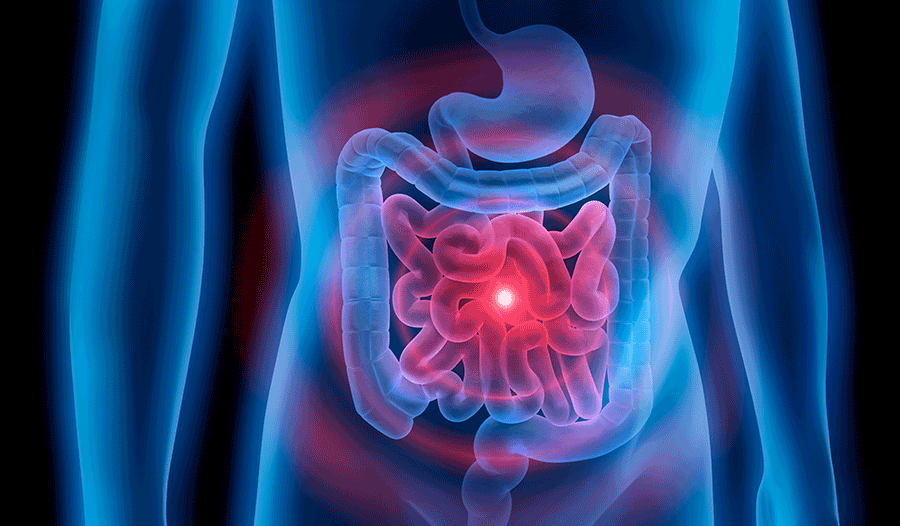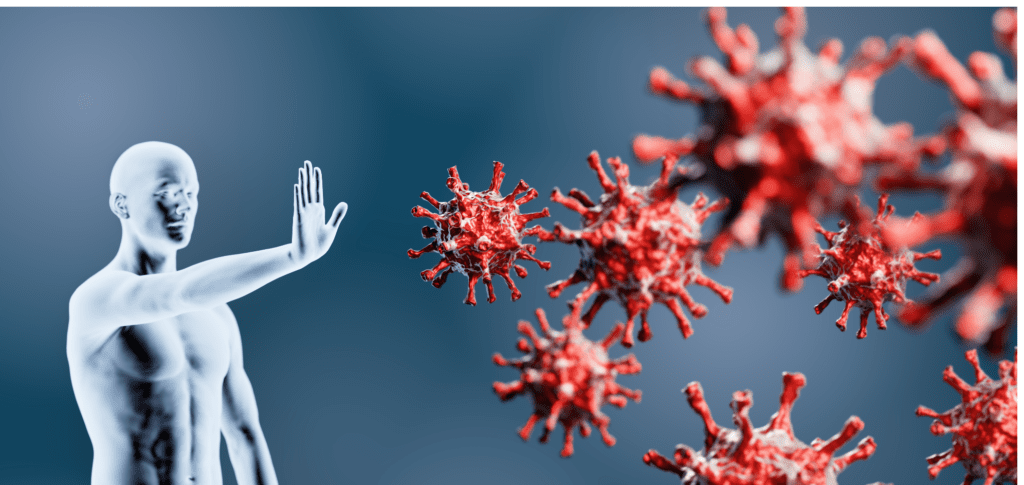Did you know that the gastro intestinal immune system makes up nearly 70% of your entire immune system?

Your intestinal tract (IT) plays a central role in your immune system homeostasis. The IT is your main point of contact with the external environment because of what we introduce orally, that is, what we choose to eat and drink. The critical importance of the gastrointestinal system to our immunity is defined by the vast number of immune cells that reside within it.(1)
In the covid world we are living in, the pre-eminent focus is on preventing spread of the disease: prescribing both social distancing and sanitary practices, but, given that most of us now believe that catching covid is not an if but when ( and for some multiple times) doesn’t it raise the question that maintaining strong immunity is a pivotal yet under played part of your overall personal health programme, creating not only a barrier against illness – but ensuring the best possible recovery if you do happen to fall ill?
Understanding how much of your immunity is embedded in your digestive system therefore makes being mindful of what you eat an essential practice – and fortunately, it’s one element and behaviour that is in your control.
“How many of us know the food we eat has a larger effect on our gut health than any other element of our immunity?”
Your gut Microbiome – is your own personal “Microbe Community” – present in the tract from your mouth to your colon, but more specifically your upper and lower intestines, consisting of trillions of micro-organisms which include: Bacteria, Fungi, Viruses & Parasites. In a healthy body they are represented in both diversity and balance – and at any given time there are also the presence of pathogens (disease causing agents) however they all live relatively symbiotically in a healthy body.
Many things can disturb the balance/diversity and subsequently make the body more susceptible to disease – most of us understand that certain medications eg anti-biotics, stress and lack of physical activity “can interfere with our gut” – but how many of us know the food we eat has a larger and more sustaining effect on our gut health than any other element and therefore impacts our overall immunity?

One of the first ways we can affect healthy gut diversity is through a lack of key dietary elements especially fibre. We need to have the presence of these food types to activate and utilise certain types of gut bacteria or they diminish and become dominated and imbalanced.
Dietary fibre such as fruit, vegetables, nuts, legumes and whole grains are the best fuel for “healthy” gut bacteria. When bacteria digest fibre they produce Short Chain Fatty Acids (SCFA) which the body uses as a nutrient source, but SFCA are also a major player in maintenance of gut and immune homeostasis, metabolic processes and muscle function. Research has also shown how important SCFA are in regulating inflammation & disease in the body (3) (4).
Preserving Your Gut Biome – What we eat, how we prepare…
Processed foods, refined carbohydrates & sugars, processed meats, excessive alcohol, trans fats, seed oils, & excessive caffeine aggravate the precious balance we need to be at our optimum.
When we eat low fibre and more processed foods, we are providing less fuel for the more “healthy” gut bacteria, reducing their use and presence – resulting in less diversity of our gut biome.
How we prepare our food has an effect on our bacterial diversity as well – Minimally processed, fresher food contains more fibre, promoting the presence of more bacteria diversity and SCFA. So yes, deep fried, takeaways, and anything pretty much anything bought from the supermarket that isn’t against the walls in a refrigerated environment contributes to an imbalance and ill health in our gut.
“Just because it is on the supermarket shelf – doesn’t mean its safe to eat”
Some foods can be used to redress imbalanced gut diversity – Fermented foods contain high levels of helpful gut bacteria – fermentation is a traditional method of preserving foods used for many years pre refrigeration. Kefir ( I prefer coconut based) low in sugar, pre and pro biotic yoghurts, Kimchee, sour kraut and Tempah are all good examples of foods that can help restore balance back to the gut
Acute Versus Chronic
Here is the ‘Moderation factor” – if you are only introducing aggravating foods 2 or 3 times per week (3 out of 21 meals) you can expect to experience mild or acute inflammatory symptoms – e.g. discomfort, bloating and gas – however if these types of foods are your main source , you are potentially, long term moving to a more chronic inflammation response in the gut. This can include joint pain, fatigue, depression, weight gain, poor sleep, and of course lifestyle diseases and illnesses, including cancers, heart disease, auto immune disease & brain inflammatory disease.
The key recommendations I make to someone wanting to improve their gut health might be obvious but would include:
- Reduction in stress
- Diversity of food – not being “orthorexic” that is eating the same food all the time
- Loads of lovely plant phenols – Fibre Fruits and Vegetables
- Stay Active or get active if you are not
- Limit alcohol
- Keep Caffeine to one to two cups a day
- Eat fermented food

References used for this article
1. G Vighi,* F Marcucci,‡ L Sensi,‡ G Di Cara,‡ and F Frati‡
“Allergy and the gastrointestinal system” US National Library of Medicine; Sept 2008
https://www.ncbi.nlm.nih.gov/pmc/articles/PMC2515351/
2.den Besten, Gijs., et al. The role of short-chain fatty acids in the interplay between diet, gut microbiota, and host energy metabolism. J Lipid Res. 2013 Sep; 54(9): 2325–2340.
3Jian Tan 1, Craig McKenzie 1, Maria Potamitis 1, Alison N Thorburn 1, Charles R Mackay 2, Laurence Macia 3The role of short-chain fatty acids in health and disease National Centre for Biotechnology Information; 2014
https://pubmed.ncbi.nlm.nih.gov/24388214/
4.Marco A.R. Vinolo,* Hosana G. Rodrigues, Renato T. Nachbar, and Rui Curi 2011
Regulation of Inflammation by Short Chain Fatty Acids US National Library of Medicine;
